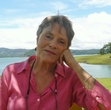Sandra Shaw Homer's Blog, page 3
July 26, 2022
Endings
In literature, we have a chance for closure. We can put the punctuation mark wherever we like, whether it marks the end of grief, the beginning of a relationship, the birth of a child, the end of a life, or the decision to live again. . . . Writers are not seers. Armed with the “knowledge of what has gone before,” we mold events, truths, into narrative, and hope and know that the last punctuation mark is not the end, but the invitation to begin again.
http://blog.pshares.org/index.php/aut...
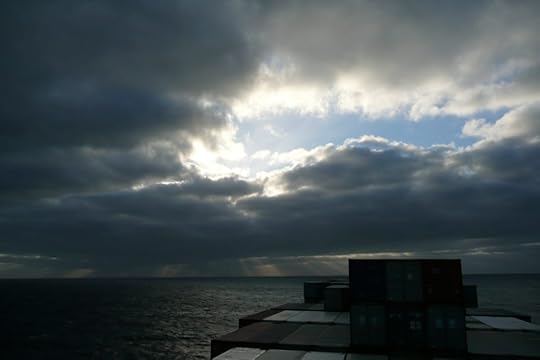
July 10, 2022
Traveling to Write
In the roomy bottom drawer of my desk are three generations of travel journals, my grandmother’s, my mother’s and mine. My grandmother’s are strictly reportorial: “Spent entire day in my room with diarrhea. Missed tour of Santa Maria Novella.” My mother’s style is livelier and more descriptive: “Went to Les Halles at 3 AM and had some onion soup, along with a couple of glasses of brandy, and then irresistibly bought an entire crate of the most beautiful peaches.” For years my mother kept the ship’s logs as she and my father knocked around in small yachts. These make pretty dry reading – position, wind, currents – but every once a while something interesting happens – the anchor dragging in the middle of the night, the dinghy painter separating mysteriously from its cleat – and these call forth my mother’s seemingly endless talent for limericks, small bright “literary” moments of sheer entertainment.
My own journal style has tended to follow my mother’s and I have found that describing things adds immeasurably to the pleasure of travel. I never wrote specifically for entertainment, however, until I took a forty-nine day freighter voyage around the South Pacific. “But what are you going to do all day?” my friends asked. “Write about it, of course. You want to be on the mailing list?” And as I sailed along I set about writing my first full-length travel manuscript, Letters from the Pacific: Forty-Nine on a Cargo Ship.
The original idea had been simply to describe what was happening and send it back to friends and family in installments whenever I got to an Internet café in port. But very early in the voyage it became clear that I was taking this trip for a lot of reasons that had nothing to do with adventure and I started working on a parallel journal as my feelings opened up in the presence of all that wide, wild, empty ocean. This is when I started to discover the power of memoir – and the fact that travel, removing yourself bodily from your daily life for extended periods of time, offers a wonderful opportunity for reflection and truth-telling.
It also offers the perfect chance to practice one’s powers of description:
Cruising along the north coast of Honduras at 257˚, west by south, at 11.5 knots, winds so light that the sea looks wrinkled like the skin of a pachyderm. A torpid haze hangs over us, deadening the light, turning the nearby Bay Islands into amorphous humps rising out of oblivion.
Characterization:
The Captain’s Dinner Diatribe tonight wound up with, “Media, politics, all just a circus.” He took a forkful of salad and then looked at us both intently over the rims of his glasses. “Like the Romans – give them bread, give them circus. Keep the people happy.”
“But, Captain you’re so cynical!” I protested.
“And the world is not cynic? What about Iraq and the so-called weapons of mass destruction? Three days after invasion they are saying, no weapons of mass destruction. That is not cynic?”
I countered, “The western powers were supporting Saddam Hussein for years. I would call that invasion hypocritical.”
“And what means hypocrite?” Rodolfo and I were obviously expected to wait for the answer. “Hypocrite, Greek, it means actor.” And he lifts his hands from the table, palms up, in that international gesture that says, “What more to say?”
Comedy:
The morning after my first night in the room, I reported to the Signora the foul emanations of sewer gases from the bathroom during the night. Unable to sleep, I had sniffed around until I identified the shower drain, no doubt squeezed into the old building without a trap. I threw a towel over it and went back to bed. The Signora told me that “these smells always occur in the bad weather,” and then she suggested I use a wet towel next time. I recognized in her insouciance about the plumbing something wonderfully familiar, and it felt just like home.
Reflection:
It’s incredible to me to be passing Morocco, Algeria, and Tunisia in my transit to Malta, these places having been nothing more for me than bad news in the daily paper. Now the shadow of the coast, sometimes visible, sometimes not, haunts me, because I know I’ll never go there and its mysteries will remain forever locked in the realms of fantasy and horror. Incredible also are the stars; we are somewhere around the thirty-ninth parallel, not that far south of where I grew up and lived half of my adult life. Could it be that this is the same nighttime sky?
Traveling is a little like losing your identity; everything familiar that defines who you are is gone and you open up more fully to your surroundings, emptying yourself of the quotidian so as to fill yourself with the new and strange. In such open-hearted states experience becomes more intense, and this lends great power to the pen. Somewhere I read recently a quotation that I wish I could ascribe: “Great stories happen to the people who can tell them.”
Someone asked me recently where I ever acquired the dream of freighter travel, and I couldn’t pinpoint it. I love the ocean, certainly – many happy times spent on small boats – and the romantic idea that must be hidden away in some nook in our culture of climbing on board a freighter and writing a book, destinations be damned. And I had always loved tales of ships and the sea. If you have ever read any of the rich literature of the sea (Conrad, Melville, Dana), you know that there’s plenty to describe out there in the middle of nowhere, where it becomes a challenge to observe everything in great detail. People, conversations, the subtleties of relationships in close quarters, the weather, the movements of the ship, and the ever-changing sea and sky.
One freighter voyage was not enough, and my latest voyage took me to Europe. While the first voyage had not been at all about destinations (more like jumping off a cliff), the second one was; there were a few people I had to see and things I had to do before a looming major surgery that might have made any future such trip impossible. Facing my increasing physical disability made this trip a great deal more poignant, and I determined that it would be an active search for the joie de vivre. So this time I was writing with a special purpose, and that was to focus on all the things that gave me joy – the vivid colors of a fishing boat in Malta, the first taste of a seafood ravioli on the Italian coast, the silky perfection of a Michelangelo sculpture, sharing a day in a remote Alpine village with the family of a dear friend, holding my sister’s hand in Paris as we both felt the tones of an 18th-century cello pierce our hearts. There was so much more… and I realized that writing about it all helped me to find what I was looking for.
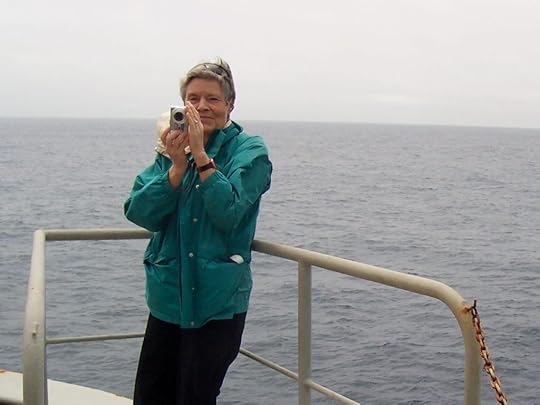 At the Bow of the HS Schubert, North Atlantic
At the Bow of the HS Schubert, North Atlantic
January 12, 2022
When the Music Plays You
“I love trying to spin the world into a web of words. And I love those times when it feels like those words turn into a world of their own.” — Rose Auslander
I am seventeen and practicing the piano. I go at it two hours a day, and no longer need the nagging of my parents, when I used to prefer playing softball after school. The work itself is its own reward, playing a passage over and over at different rhythms, until it comes out smooth as silk.
I rarely practice after dark, since I don’t want to disturb my father, who may have brought work home. But now that I’m on the yearbook committee, there are days when I simply have to. It’s winter and the room is dark except for the light over the piano, and I feel my father’s entrance and his quiet sigh as he sits down well away from the piano and me.
It is near the end of my practice session, when I play something for pure pleasure, and tonight it’s a Schubert impromptu, a piece I love to play, complex and romantic. I am aware that my father is in the room; I am aware of all the ambiguities of our relationship; I know, however, that my ability to play so well has pleased him, and that falls into the complexity of Schubert, me, my father, the abuse, all the pain of never knowing if he has loved me or not.
Somehow, I throw myself into the music, I become the music, the music — Schubert — is playing me. It’s transformative. I am no longer in this darkened living room. My father is still here, because there is a musical line connecting us, and I thrill as the phrases and chords and notes become a world of their own — a world described by incredible beauty and freedom. And at the end, I bow my head over the keys and feel full of the act of love I have just performed.
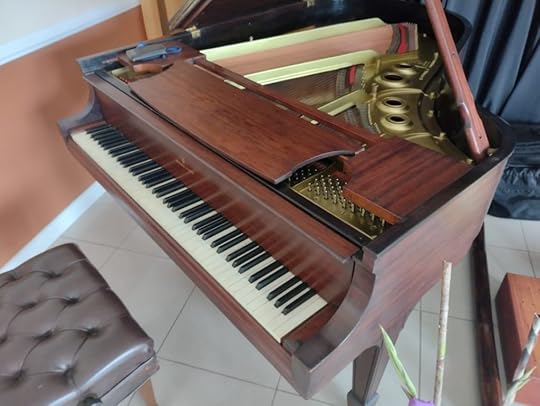 Photo by Roger Eichholz
Photo by Roger Eichholz
October 10, 2021
Silence
Once again, I have run across a fragment that long ago I stashed in a dark corner of my computer for future use, and I failed to attribute it. I like this piece because it fits so well with my focus on the natural world, both in Evelio’s Garden, and in my daily life. If anyone recognizes this piece or its writer, please let me know so I can attribute it properly. Thanks. SSH
[image error]Hello chatter, my old friend.
The sounds of silence are a dim recollection now, like mystery, privacy and paying attention to one thing — or one person — at a time.
As far back as half-a-century ago, the Swiss philosopher Max Picard warned: “Nothing has changed the nature of man so much as the loss of silence,” once as natural as the sky and air.
As fiendish little gadgets conspire to track our movements and record our activities wherever we go, producing a barrage of pictures of everything we’re doing and saying, our lives will unroll as one long instant replay.
There will be fewer and fewer of what Virginia Woolf called “moments of being,” intense sensations that stand apart from the “cotton wool of daily life.”
“In the future, not getting any imagery or story line or content is going to be the equivalent of silence because people are so filled up now with streaming video,” said Ed Schlossberg, the artist, author and designer who runs ESI Design. “Paying attention to anything will be the missing commodity in future life. You think you’ll miss nothing, but you’ll probably miss everything.”
Schlossberg said that, for a long time, art provided the boundary for silence, “but now art, in some cases, is so distracting and intense and faceted, it’s hard to step into a moment. Especially when you’re always carrying a microcamera and a screen all the time, both recording and playing back constantly rather than allowing moments of composition and stillness when your brain can go into a reverie.”
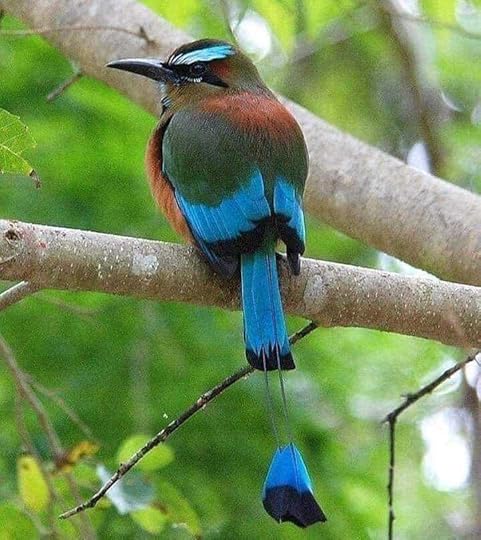
August 10, 2021
Seeing from the Heart
I believe natural beauty has a necessary place in the spiritual development of any individual or any society. I believe that whenever we destroy beauty, or whenever we substitute something man-made and artificial for a natural feature of the earth, we have retarded some part of man’s spiritual growth.
I believe this affinity of the human spirit for the earth and its beauties is deeply and logically rooted. As human beings, we are part of the whole stream of life. We have been human beings for perhaps a million years. But life itself — passes on something of itself to other life — that mysterious entity that moves and is aware of itself and its surroundings . . . . Our origins are of the earth. And so there is in us a deeply seated response to the natural universe, which is part of our humanity.
Rachel Carson
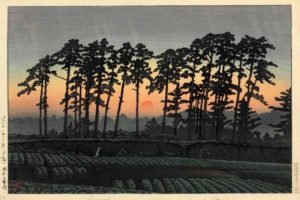
March 27, 2021
Another Stellar Review of Evelio’s Garden
I read Evelio’s Garden slowly so as to enjoy every moment to the full. I enjoyed the prose, as well as the combination of the author’s personal moments with the beautiful descriptions of places, landscapes, nature and people, all of which make the reading very agreeable. The strength and positive attitude with which she confronts the vicissitudes and difficulties, without losing her calm and sense of humor, are admirable. The descriptions of some of the situations are really comical: for example, the bonsais, Ruth and the bats, the rice and beans on her bus trip to San José. The relationship with Evelio is truly special; her patience, tolerance and empathy are admirable. The way she describes moments of frustration, pain and anger, along with happiness and humor is marvelous. All of these elements mixed with the descriptions of people, customs, the culture, birds, plants and the countryside, made for me, one of those “trips” that will never be forgotten. My gratitude for the gift of these memoirs and the hours of pleasure I spent reading them. — Enrique Venegas
December 22, 2020
Finding the Right Words
For a long time, I have looked for a way to describe my connection to the natural world. I tried in Evelio’s Garden, but no writer that I have encountered since has come as close as I have the privilege to quote here. Of course there have been many before me, but none that I have discovered as right on as these two: Robinson Jeffers and Oliver Sacks. (And I’ll keep looking!)

The parts change and pass, or die, people and races and rocks and stars, none of them seems to me important in itself, but only the whole. This whole is in all its parts so beautiful and is felt by me to be so intensely in earnest, that I am compelled to love it, and to think of it as divine. It seems to me that this whole alone is worthy of the deeper sort of love; and that here is peace, freedom, I might say a kind of salvation.
— Robinson Jeffers
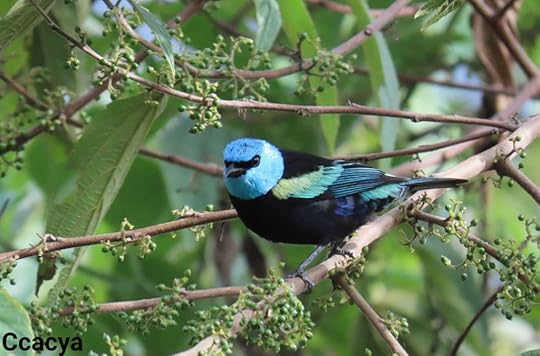

The sense of deep time brings a deep peace with it, a detachment from the timescale, the urgencies of daily life. Seeing these volcanic islands and coral atolls, and wandering, above all, through this cycad forest on Rota, has given me an intimate feeling of the antiquity of the earth, and the slow, continuous processes by which different forms of life evolve and come into being. Standing here in the jungle, I feel part of a larger, calmer identity; I feel a profound sense of being at home, a sort of companionship with the earth.
– Oliver Sacks
October 4, 2020
Some Wisdom from George Bernard Shaw
“The single biggest problem in communication is the illusion that it has taken place.”
September 1, 2020
Telling Stories
There’s a big difference between writing stories and telling them out loud. This is something I’ve discovered as, over the years, I have recorded bits and pieces of various things I have written. Somehow, the spoken word is infinitely more powerful. Recently I was invited by an interviewer to record a story from Evelio’s Garden, and since her website focused on finding joy in our lives, I picked robins and sea lions. Well, listen and you’ll see how they’re related.
July 9, 2020
Georgia O’Keefe on the Art of Seeing
I
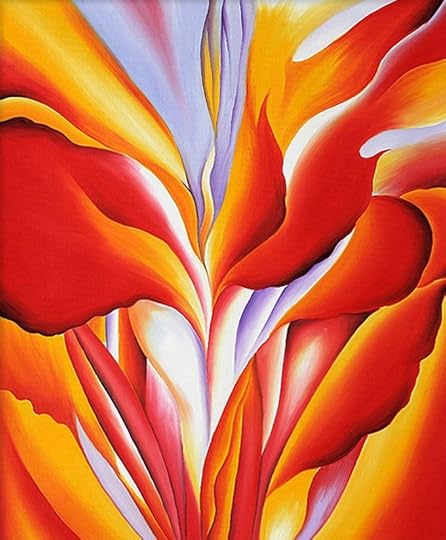
Georgia O’Keeffe, Red Canna, 1924 (Georgia O’Keeffe Museum)
In a passage originally published in the exhibition catalog An American Place, she writes, “A flower is relatively small. Everyone has many associations with a flower — the idea of flowers. You put out your hand to touch the flower — lean forward to smell it — maybe touch it with your lips almost without thinking — or give it to someone to please them. Still — in a way — nobody sees a flower — really — it is so small — we haven’t time — and to see takes time, like to have a friend takes time. If I could paint the flower exactly as I see it no one would see what I see because I would paint it small like the flower is small.
“So I said to myself — I’ll paint what I see — what the flower is to me but I’ll paint it big and they will be surprised into taking time to look at it — I will make even busy New-Yorkers take time to see what I see of flowers.
“Well — I made you take time to look at what I saw and when you took time to really notice my flower, you hung all your own associations with flowers on my flower and you write about my flower as if I think and see what you think and see of the flower — and I don’t.”

